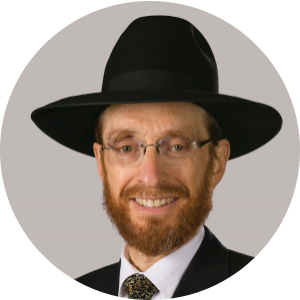Ice Skating and Miniature Golf

If the Master Matchmaker has placed you together with your spouse, it is for the purpose of helping you grow
“V
elvel” said he was calling about a marital issue, but he requested an individual appointment for himself, “at least to start.”
When Velvel sat down for the initial consultation, the furrows in his brow were deeper than those of an Iowa cornfield. And I could see he was carrying the burden of a considerable weighty matter.
“My wife is an excellent mother and housekeeper,” Velvel began, as if he suspected me of believing otherwise. “I’m very fortunate to be married to her. And we don’t really have any shalom bayis problems, baruch Hashem.”
Then Velvel took a deep breath and haltingly revealed what had prompted him to reach out to me. “Unfortunately, however, she doesn’t enjoy the things that I like to do.”
“What kind of things are you talking about?” I asked.
“Look, I work in the finance industry,” Velvel replied, defensively. “And when I have time off on the weekends, or when we’re on vacation, I need to really unwind. But my wife is unwilling to join me in the things I like to do.”
“I still do not understand what exactly are the things you like to do,” I said, gently.
“Okay,” Velvel relented, “I’ll give you a couple of examples. I enjoy the outdoors. I like to go ice skating in the winter and hiking in the woods during the summer. And I would love it if my wife came with me. But since we’ve been married, I have to either go with a friend or do these things alone.”
“Do you discuss this with your wife at home?” I probed further.
“Are you kidding?” Velvel asked, rhetorically. “We talk about it all the time. She says she’s not comfortable doing these things.”
He threw up his hands in a gesture of hopelessness. Then he went on to elaborate on his feelings of disappointment and frustration with what he saw as his wife’s stubbornness about not wanting to try new activities.
“How would you feel if I meet with your wife to get her take on this?” I asked toward the end of the session.
Velvel was very receptive to my suggestion and appeared hopeful for the first time since he had walked into my office.
The following week I met with Velvel’s wife, “Ita.” And without hesitation, she got straight to the point.
“Velvel has been nagging me about joining him for hikes in the woods and ice skating ever since we got married almost a year ago,” she said, softly. “Look, I’m a regular Bais Yaakov girl. My idea of a good time outdoors is to go for a walk in the park. I also enjoy going to museums. But Velvel says that museums are boring and he has no patience for them. You know, I haven’t changed since we got engaged. I never pretended to like outdoor sports. In fact, the only outdoor activity we did while dating was playing miniature golf on our last date before Velvel proposed.”
“How would you feel if the three of us discussed this together?” I asked, looking for some wiggle room.
“I just wish Velvel would accept me as I am,” Ita replied. “But I’m willing to have a joint session if that would get him to stop harassing me about this. I’ve told him I don’t mind if he goes out with his friends. But I was never into sports, even as a single girl.”
I met a few times after that with Velvel and Ita together, until it became clear to all three of us that since Velvel was unable or unwilling to adjust his expectations and Ita refused to move out of her comfort zone, their impasse was insurmountable.
Apparently, Velvel and Ita never learned what the baalei mussar teach us: that, along with learning Torah, performing mitzvos, and seeking opportunities to benefit others, one of the main reasons we are in this world is to work on and improve our middos. And one of the main institutions HaKadosh Baruch Hu created to assist us in our task of perfecting ourselves is marriage.
R
av Shamshon Raphael Hirsch, in his commentary on Chumash (Bereishis 2:24), clarified the reason for the issurei arayos, the laws of forbidden marriages.
A man, in the choice of a wife, is to go away from the parental home, accordingly not to look for a wife amongst too near [relatives]… Because the wife is to be the eizer of her husband, she must be k’negdo; because she is to complement him, she must have different characteristics [from] his. If they are nearly related, they would perhaps have the same virtues, but also perhaps the same faults; the same perfections, but also the same deficiencies; their union would only strengthen and intensify the characteristics in both directions, good and bad, but they would not complement each other. Only more distant grades would… produce the perfect being… and achieve more purely and completely the one great human task [of perfection].
A while back, Rav Mordechai Dolinsky z”l, the late mashgiach of Yeshivah Torah Ore in Yerushalayim, shared with me that many years earlier, when he was a bochur on the cusp of entering into shidduchim, he decided to first consult with various gedolim to receive their hadrachah. Upon meeting with Rav Chaim Pinchas Scheinberg ztz”l, the late rosh yeshivah of Torah Ore, the young Reb Mordechai asked what he should be looking for in a shidduch. Rav Scheinberg then made the following personal disclosure.
“Before I tell you what to look for,” Rav Scheinberg began, “let me tell you what not to look for. You should not look for a clone of yourself, someone who is just like you. After I married my rebbetzin, I realized how privileged I was to have married her. You see, we have very different personalities. I am a deep thinker, an intellectual type, while my rebbetzin is very sociable and outgoing.
“Had I married someone like myself instead of like my rebbetzin, every day in my home would have been Tishah B’Av, with two such serious people. But since I was fortunate enough to marry my rebbetzin, there was joy and liveliness in our home, which created a much more conducive atmosphere for raising children.”
The point here is not that “opposites attract,” or that one should look for a spouse who is totally different. Rather, what Rav Shamshon Raphael Hirsch and Rav Chaim Pinchas Scheinberg are trying to teach all the Velvels and Itas of the world is that if the Master Matchmaker has placed you together with your spouse, it is for the purpose of helping you grow. And if your spouse does not enjoy what you do, your job is not to launch a crusade to find someone to change him or her for you.
Rather, you should try to respect your spouse’s preferences and think more about pleasing your spouse than about your spouse pleasing you. Then you will be using your differences as an opportunity to build your character by working on your middos, which is one of the primary purposes for which HaKadosh Baruch Hu has put you and your spouse together in the first place.
A sobering thought for us all.
Now some readers may be wondering, when spouses differ in what they enjoy doing, as Velvel and Ita did, can the conflict ever be resolved? Who should do the conforming? And should the other spouse be making any concessions at all?
Principle or Preference
To my way of thinking, there are only two methods to resolve such marital conflicts. I call these “principle” and “preference.” Let me explain.
Principle refers to correct and incorrect, or the way things ought to be. Using this approach, spouses try to convince each other, “I am right and you are wrong.” To bolster their arguments, they may cite Torah or, l’havdil, secular sources. They may point to family, friends, or neighbors who support their point of view. Or they may seek a third party to serve as arbitrator to indicate who is right and who is wrong.
In my clinical experience, however, I have found that discussions based on principle frequently descend into heated debates and even arguments, with no resolution of the conflict. In spite of the futility of this approach, most couples turn to it first, for two very good reasons.
First, if a spouse wins a dispute based on principle, he or she owes the other spouse no debt of gratitude. After all, the other spouse is now seeing the light and just agreeing to do what is correct.
The second reason the principle approach is favored is that once the other spouse accepts the principle, the issue never has to be raised again. It is now finally put to rest.
The principle approach fails so frequently, however, for the same two reasons. If one spouse yields, he or she cannot look forward to any gratitude for the concession. Furthermore, he or she loses any chance of revisiting the matter and is now locked into the concession until 120.
The other approach, preference, which I always recommend, refers to the process of negotiation. In other words, both spouses come to the bargaining table with mutual respect for each other’s feelings and preferences, without judging them. And each spouse is entitled to want whatever he or she wants. Then they discuss their differing preferences, looking for opportunities to compromise. No one gets everything he or she wants. But both spouses get more from each other than they would have by remaining stuck in the stalemate.
Returning to Velvel and Ita, both would not budge from their penchant for the principle approach. Velvel believed that a wife should always try to conform to the wishes of her husband. And Ita believed that she should never be asked to move out of her comfort zone.
Had they been willing to consider the preference approach to their conflict, however, they might have been able to resolve their differences. For example, Ita might have proposed that they try going on an outdoor picnic. Or at least she might have asked Velvel how he would feel if she accompanied him to the skating rink and sat in the stands.
Furthermore, Velvel might have suggested they experiment with a visit to a sports museum. Or at least he might have challenged Ita to another round of outdoor miniature golf. In other words, had they accepted the legitimacy of each other’s preferences, they might have been open to exploring compromises.
And when spouses make concessions in order to please each other, they are refining their middos, achieving true shalom bayis, and thereby fulfilling the ultimate purpose of their Heavenly orchestrated union.
Dr. Meir Wikler, a frequent contributor to this space, is an author, psychotherapist, and family counselor in full-time private practice, with offices in Brooklyn and Lakewood. He is also a public speaker whose lectures and shiurim are carried on TorahAnytime.com
(Originally featured in Mishpacha, Issue 969)
Oops! We could not locate your form.






